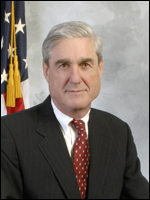Former FBI Director Mueller drops by first-year SLS criminal law class, puts new twist on Socratic method

Stanford, Calif., October 16, 2013 – A group of Stanford Law School students enjoyed a rare surprise recently when former Director of the Federal Bureau of Investigation (FBI) Robert Mueller dropped by their classroom and put his unique spin on the Socratic method. Mueller, the 2002 recipient of SLS’ Jackson H. Ralston Prize, came to SLS to visit Dean M. Elizabeth Magill, but decided to join a criminal law class and spend some time with students.
Edwin E. Huddleson, Jr. Professor of Law Robert Weisberg knew that Mueller might appear in class, but was reluctant to make any premature promises to his students.
“I didn’t expect him to come,” Weisberg said. But after learning more about Mueller’s schedule for the day, Weisberg realized that a visit from Mueller was truly possible and prepared his students.
“‘Look, this is going to sound a little strange,’” Weisberg told the class, adding that a “major figure in law enforcement” might join them, but that he would not identify the figure just yet. When Mueller did indeed arrive in the classroom, the students were taken aback.
“I remember looking up from my notes, seeing someone standing in the doorway … and thinking, ‘That can’t possibly be who I think it is,’” said Scott Toussaint, JD ’16. “Sure enough, it was.”
Mueller has always wanted to teach such a class, according to Weisberg, and both he and the students made maximum use of their time together.
After sitting “patiently and quietly” in the front row, Mueller began asking students about their motivations for attending law school, explained Erin Olivella-Wright, JD ’16. “He seemed genuinely interested in the students.”
Mueller also invited the students to ask questions of him. The students delved into critical subjects immediately, ranging from how Mueller exercised discretion in criminal charging matters to the qualities Mueller valued when hiring attorneys during his years in senior law enforcement positions.
For Austin Lee, JD ’16, some of Mueller’s most memorable remarks concerned his very first days at the FBI. Noting that he assumed leadership of the agency just one week before the 9/11 attacks, Mueller explained that his initial focus was on finding and prosecuting the responsible individuals. But when President George W. Bush asked Mueller how to prevent future attacks, Mueller shifted his focus to prevention.
“I felt that this moment was very powerful in [Director] Mueller’s approach at the FBI over the next decade, and I am extremely fortunate to have heard him comment about this experience,” Lee said.
Weisberg, meanwhile, was thrilled to welcome Mueller to the classroom. Describing Mueller as “an incredibly important and admired figure,” Weisberg cited the U.S. Senate’s unanimous approval of Mueller for the FBI directorship. The Senate vote was “a rare instance where everyone agreed by objective criteria” that the nominee in question was the most qualified person for the job.
Mueller is “above politics, a real pro,” Weisberg praised. Weisberg also appreciated how “informal and gracious” Mueller was when interacting with the students.
The students were equally excited.
“Having Director Mueller attend our criminal law class was an incredible privilege and made me so grateful to be at Stanford Law School, where we are able to interact with some of the most influential lawyers and policymakers in the country,” Olivella-Wright said.
Mueller’s visit “was a reminder of what a special and unique place SLS is,” Toussaint added. “We had just had Justice Ginsburg on campus two days earlier … and then the Director of the FBI drops by to teach criminal law. [I]t reminded me exactly why I wanted to come to Stanford.”
“I am so appreciative that Director Mueller took time from his schedule to engage with our students,” Dean Magill said. “Not many students of criminal law get to hear directly from one of the most distinguished figures in law enforcement history, so I am especially delighted for them.”
About Stanford Law School
Stanford Law School is one of the nation’s leading institutions for legal scholarship and education. Its alumni are among the most influential decision makers in law, politics, business, and high technology. Faculty members argue before the Supreme Court, testify before Congress, produce outstanding legal scholarship and empirical analysis, and contribute regularly to the nation’s press as legal and policy experts. Stanford Law School has established a new model for legal education that provides rigorous interdisciplinary training, hands-on experience, global perspective, and focus on public service, spearheading a movement for change.
